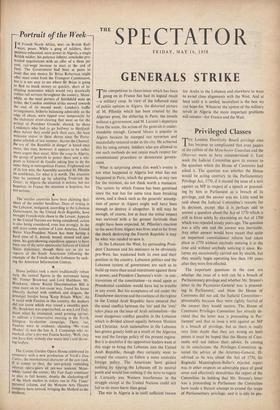Portrait of the Week
TN French North Africa, war; on British Rail-
ways, peace. While a gang of soldiers, their Patience exhausted, seize power in Algeria, a single British soldier, his patience infinite, concludes pro- tracted negotiations with an offer of a three per cent. rail-wage increase to start at the end of June. The Government had been at pains to insist that any money Sir Brian Robertson might offer must come from the Transport Commission, but it is not easy to see where Sir Brian is going to find sa much money so quickly, short of in- stituting economies which would very drastically reduce rail services throughout the country. Mean- while, as the meat porters of Smithfield went on strike, the London omnibus strike moved towards the end of its second week; London's traffic arrangements, hitherto balancing admirably on the edge of chaos, were tipped over temporarily by the elaborate street-clearing that went on for the arrival of President Gronchi, elected, by those Londoners who had to go halfway to Hertford- shire before they could park their .cars, the least welcome visitor to these shores since the Portu- guese jellyfish of last summer. Across the Channel, the cry of 'the Republic in danger' is heard once more; this time, however, it appears to be rather more urgent than usual. After the coup in Algeria, the group of generals in power there sent a tele- gram to General de Gaulle asking him to do the same thing in metropolitan France. Frightened out of its few wits, the Assembly accorded M. Pflimlin its confidence, for what it is worth. The situation may be summed up by adapting Frederick the Great : in Algeria the situation is serious, but not hopeless; in France the situation is hopeless, but not serious.
The smaller countries have been claiming their share of the smaller headlines. Days of rioting in the Lebanon, instigated, according to the Lebanese Government, by the United Arab Republic, have brought French-style chaos to the Levant. Appeals to the United Nations are being considered; action is also being considered, even less strongly. In the still more comic nations of Latin America, United States Vice-President Nixon has been having a hard time of it. Jeered, booed, stoned and spat Upon, his gum-showing expedition appears to have been one of the more spectacular failures of United States diplomacy, though there are as yet no reports of the South Americans following the example of the French and the Lebanese by sack- ing the American Information Centres.
Home politics took a more traditionally robust turn, the central figures in the movement being Mr. Fenner Brockway and Lord Hailsham. Mr. Brockway, whose Racial Discrimination Bill is once more on its lost-cause way, found his house liberally daubed with symbols and slogans, the Principal burden being 'Keep Britain White.' As is usual with Fascists in this country, the daubers did not know which way round a swastika goes. MI. Brockway was unperturbed, as was Lord Hail- sham when he attempted, amid growing uproar, to address a Conservative meeting in the North Islington by-election campaign. There, too, Fascists were in evidence, chanting 'We want Mosley' (it was the late A. J. Cummings who re- marked, after a pre-war Fascist hooley, 'Well, they can have him; nobody else wants him') and throw- ing leaflets.
The Covent Garden Opera House celebrated its centenary with a new production of Verdi's Don Carlos, the international character of the cast (and, if it comes to that, the seat-prices) reminding veteran opera-gOers Of pre-war seasons : Mean- while, round the corner, My Fair Lady continues to play to full houses, despite the slackening-off of the black market in tickets run in The Times' Personal column, and the Moscow Arts Theatre eunipany have arrived, bringing the Method to the madness.


































 Previous page
Previous page